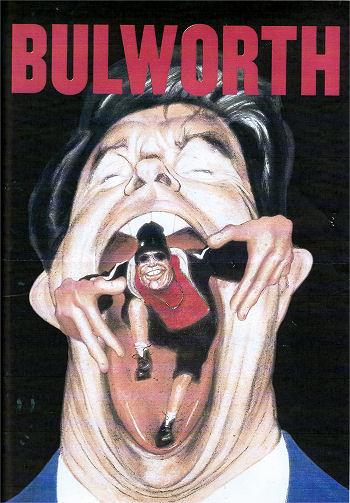I wrote a private letter to a publicist friend this evening, but I said a few things that can be passed along for general attribution. The question was about my striking a negative tone with a lot of big-studio product, so I tried to answer it…that’s not true about “trying” because it just sort of poured out.
“Look, [name]…here it is. My family lost 40% of its membership within the last four months (my sister and father both died) and I’m feeling nihilistic and fuck-all about things to some extent, and since my column is about what I’m feeling, doing, experiencing, tasting, worrying about, foreseeing, you name it…I’m probably responding to a growing sense of darkness and mortality around me and expressing reactions in a way that follows suit. That’s the genuine honest truth.
“On top of which I’m finding a freer, less inhibited voice these days. It’s hard and strenuous, but it feels amazing at the same time. You try writing eight to ten stories a day and see what comes out. After a while you can’t do the equivocating, smiley-face, loyal-opposition tightrope dance from the business-as-usual playbook. It’s the Wild West with a lot of rootin’ tootin’ buckaroos and gunslingers out there, and in the midst of this I’m trying to create something that may one day be construed to have had a semblance of value.
“I believe devoutly in writing well. And nobody, trust me, can write well while eagerly fellating the bottom-line, bottom-of-the-barrel corporate sausage factories. So what I’m trying to get into and create on a day-to-day basis isn’t the usual-usual. It’s more real and down to it, and I’m not so sure that’s such a bad thing.
“I’ve just hated much of what the big studios have put out in the last few months. So what? Who am I, Spartacus? The French resistance? I’m a small businessman trying to stand out and be a special read that you can’t find anywhere else, and at the same time make enough ad money to afford to help my kids out and maybe visit them once or twice a year.
“Who gives a shit if I don’t like corporate mass-market movies? Who cares if I don’t like the crap that the big studios put out in the late winter, spring and summer? Nobody does. I mean, except for the Hummer-drivin’ stooges out there who pay to see these movies regardless. Even if we all know they’re nowhere near as happy about these films as they’d like them to be.
“You and I know that the big studios are still making more and more crappy corporate product, and since I’m in the business of banging out eight to ten stories a day, what do you want to me to do? Become Leonard Maltin? Even if I wanted to, Leonard Maltin is taken by Leonard Maltin.
“The world is collapsing, descending into chaos, destroying itself with tribal warfare and asphyxiating itself with fossil fuels. And in a certain spiritual way, corporate Hollywood product is a part of this implosion/self destruction.
“You know it’s getting worse and worse and not likely to change. Except for this and that fall/holiday exception, the big studios don’t make movies for movie lovers like myself. They sorta did before from time to time; now they mostly don’t. They make big expensive crap-sausage movies that will hopefully turn a profit, and you know it. They make them for the unwashed, overweight taste-free homies who pay to see movies that go boom, fart, whee! and splat. You know it, I know it — why play games with each other and pretend otherwise?”
Pork-Pie Mustang

Certainly the most beautiful ’65 or ’66 Mustang (I’m not enough of a car buff to know the difference) that just happened to be parked in front of my home that I’ve ever seen in my life. Gun-metal gray, 289 cc engine, buffed and polished to a fare-thee-well, polished-oak steering wheel, factory-new black-leather seats.

Late this morning I asked a guy at a men’s clothing store store on Santa Monica Blvd. when the sales of pork-pie hats had taken off big-time, and he said “this year.” Boomers aren’t allowed to wear pork-pie hats — they’re strictly for GenXers (born from ’64 to ’80) and GenYers (’80 to mid ’90s), and certainly no one older than than middle-aged GenXers like Brad Pitt, who will be 45 this December. For three or four seconds I thought to myself, “Hey, maybe I should wear one of these dorky-looking ass hats?”
Big Mouth
And speaking of great-looking classic one-sheets, I’ve had this color scan of an early Bulworth poster sitting in my office closet for exactly 10 years and three months.
I remember interviewing the artist-marketer — the guy who took Warren Beatty‘s rough idea for a single-image concept and made it into an actual poster that stood on its own two feet — for my L.A. Times Syndicate column. I think it’s one of the greatest movie posters ever, and I can’t even find the ’98 article or the name of the guy I spoke to. I know he was living in Manhattan when we spoke.
The Searcher
90 minutes were eaten up this morning at the vet (the first of three all-in-one vaccines for Mouse), and then three and a half to four hours were consumed trying to find a place that could do a first-rate scan of a 41″ x 18″ poster of The Presbyterian Church Wager , the 1971 Robert Altman film that was renamed as McCabe and Mrs. Miller. I finally got it scanned and burned to a CD for $86.87; brand-new poster-sized prints will be ready by tomorrow or the next day.
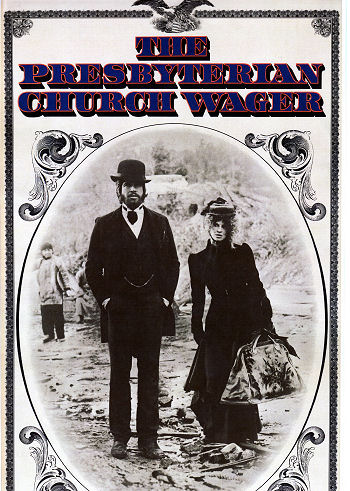
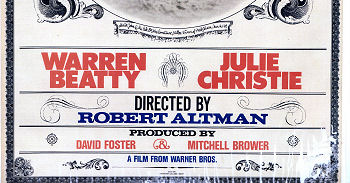
My Sir Speedy guy couldn’t scan full-scale one-sheets; ditto the local Kinkos and a place on Wilshire called Luscen. I went upstairs to an office of an architect named Jackson and asked where they scan their architectural drawings, and one of the office guys directed me to a place on Robertson just north of Olympic called Ford Graphics. Except the Ford guy only does black-and-white scans, and so he sent me over to the West L.A. branch on Military, which handles color.
Mouse, by the way, was with me the whole time and being fairly cool about it — no crying, sitting on my shoulder, checking things out, etc.
Then as I began to remove the poster from the metal-and-glass frame at Ford we realized moisture has seeped in and the lower-right portion of the poster had stuck to the glass. I had to spend a long 10 minutes slowly slicing the sticky paper shreds off the glass with a razor blade. Then I had to wait for the scan to be done and put to disc, and then I had to go back to my Sir Speedy guy and give him the disc for digital touch-ups and printing.
It all reminded me that copying and restoring old materials is a fragile undertaking, and that you have to treat all the materials with kid gloves. But what a beauty this thing is. Those rich blues and reds, the Victorian-era trim on the perimeter, etc. About as rare as rare-ass movie posters come.

The cursive caption beneath the oval-shaped monochrome photo of Beatty and Julie Christie reads as follows: “Mr. John Q. McCabe & Mrs. Constance Miller — Town of Presbyterian Church 1902.”
Bigger, Better, Cooler
Here’s an excerpt from a q & a between Film.com’s Mark Bourne and Elvis Mitchell, longtime host of KCRW’s “The Treatment” and now the host of TCM’s Elvis Mitchell: Under The Influence, which debuts this evening at 8 pm and then repeats again at 10:30 pm. An interview with Sydney Pollack starts it all off.
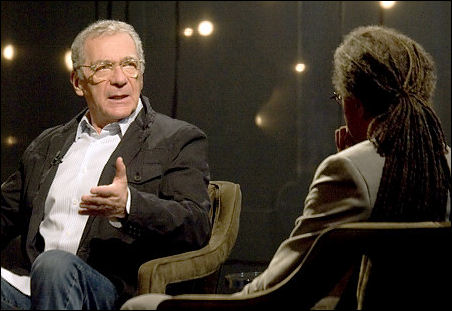
MB: “With the interviews you’ve done so far for the TV show, and to a lesser extent your radio show…”
Elvis Mitchell: “Oh, thank you, ‘a lesser extent’…”
MB: [sudden panic]: “No, no, no, I mean…”
Elvis Mitchell: “Oh, no, okay, this is what got me into therapy, right?
MB: Well, since we’re talking about the TV show….
Elvis Mitchell: “Beautifully done.”
Little Taste?
So 20th Century Fox chief Tom Rothman has hosted 16 episodes of “Fox Legacy,”the Fox Movie Channel show, and there are no YouTube clips to embed? Today’s N.Y. Times story by Brooks Barnes reports that Rothman “has developed a cult following for his historical monologues and self-deprecating style. He gets fan mail — no less a viewer than Steven Spielberg recently dropped him a note — and more episodes are on order.”
Osmosis?
Do the top people who make a film take on the look and mood of same? Or does the film take on the look and mood of these top people? Consider this photo of Mamma Mia writer, director and co-producer Catherine Johnson (l.), Phyllida Lloyd (center) and Judy Craymer (r.), which was used for a 7.6 N.Y. Times profile by Sylviane Gold. What does this photo tell you (or at least suggest) about the character and tone of the film?
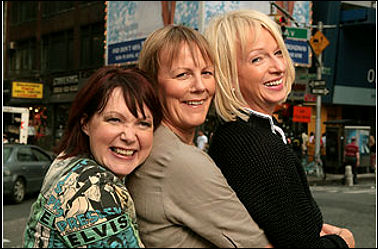
Johnson, Lloyd and Craymer
Four Issues
Someone has finally said something a wee bit contrary about The Dark Knight — amazing. Variety‘s Anne Thompson feels that the 152-minute film (a) goes on about a half-hour too long, (b) is “overwhelming” and made her feel “over-pixellated,” (c) “starts to go off the tracks” with its handling of Aaron Eckhart‘s Harvey Dent character, and (d) doesn’t spend enough time with Christian Bale‘s Bruce Wayne/Batman. Here‘s Justin Chang‘s Variety review, also up today.
Just Mentioning
A brief salute to 16 year-old Nick Plowman, a pretty good writer who runs a nice-looking film site called fataculture. (Whatever that means.) He’s from Johannesburg, South Africa, has been blogging for a year now, and is a member in good standing of the South African press. He even attended last May’s Cannes Film Festival. He says he has “big dreams to come to the US some day and continue my film journalism there.”

It’s always cool to see a 16 year-old getting down to it and…you know, slamming away like he’s 26 years old with rent and car payments and utility bills to cover each month. I wish I’d been doing something like this when I was 16 instead of just getting sloshed with my friends. My son Jett, of course, wrote a weekly column for this site when he was 16 and 17, which I naturally admired.
Timer is Ticking
People‘s Julie Jordan and Karen Snyder had obviously heard that relations between the engaged Robert Rodriguez and Rose McGowan weren’t all that smooth, which is why they called around before the July 4th holiday. “Sources” told them the director and actress are still together, and McGowan’s rep said her client will star in three of her fiance’s upcoming projects — Barbarella, Red Sonja and Woman in Chains! — “despite reports to the contrary.”
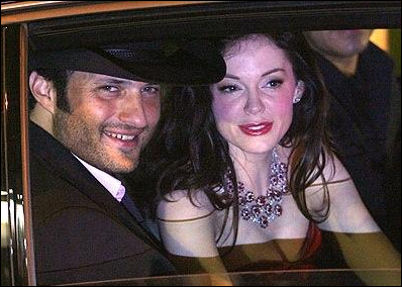
It is written on stone tablets that a lovestruck director will hold on to his actress girlfriend/wife as long as he “does” for her. If the projects they team on don’t happen or don’t make money, sooner or later she’ll push on to the next guy. It’s that simple. Fiercely ambitious, marginally talented actresses are not human, of course, and I’m not the only one to have detected the whiff of an idea over the years that McGowan is a bit of a Jezebel. So it’s really just a matter of fate and time. Life is hard then you die.
That said, the project I’d most like to see is the chicks-behind-bars movie. As long as there’s a little lezbo action and as long as McGowan and a couple of fellow prisoners escape at the end of Act Two. Barbarella could be cool, but some studio suits reportedly don’t believe that McGowan is enough of a star to justify a big special-effects budget. Red Sonja didn’t work the first time around so why go there?
Earmuffs
I’ve always been amazed that a line of dialogue this clueless and old-farty was used for a mass-market, right-in-the-swing-of-things entertainment that opened in December 1964. The author was either Richard Maibaum or Paul Dehn. It would have been out of character, yes, for Sean Connery‘s James Bond to have been a Beatles fan, but to have him speak of listening to their music with earmuffs on! Astonishing for a pop hero figure to have blurted this out at that time in history.
Not Minding
One thing when spoken by an enigmatic British hero figure, and something else entirely when attributed to an intense, moustache-wearing, curiously- behaving soldier in the Nixon administration. That said, how many people in the history of prosecution of governmental malfeasance have stood up and refused to rat? Damn few.
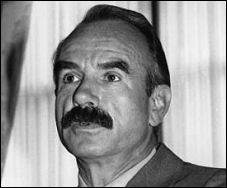
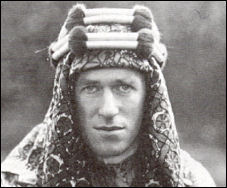
Captions withheld on purpose


